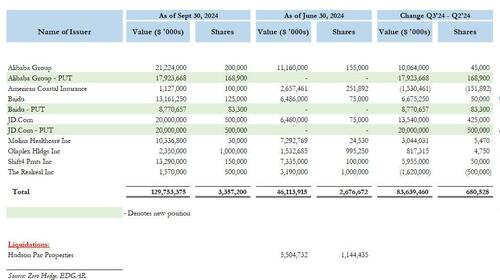
Michael "the Big Short" Burry boosted his exposures to China stocks including Alibaba, Baidu and JD.com in the third quarter as Beijing rolled out a stimulus blitz. But he also added new bearish options that would provide downside protection, a move that may have been especially prudent as the Chinese rally recently fizzled as fast as it arrived.
Scion Asset Management, Burry’s family office, increased its holdings of Alibaba by almost 30% to 200,000 shares during the quarter. At the same time, Scion bought put options with the notional value equivalent to 84% of its Alibaba holdings, according to a 13F regulatory filing on Thursday. The put options allow Scion to sell the stocks to lock in a profit or limit losses, should Alibaba tumble.

Burry used the same tactics for two other Chinese investments — Baidu Inc. and JD.com Inc.
For JD.com, Scion doubled its stakes in the three months through September while adding bearish wagers against the stock positions. In Baidu, he increased its position by two-thirds but also hedged its exposure.
The full breakdown is below. The three Chinese stocks including Alibaba were worth $54 million at the end of September, representing about 65% of Burry’s total equity holdings. The hedges could have proven timely according to Bloomberg.
The three stocks all have lost more than 20% since peaking in early October, retreating to levels when Beijing announced stimulus in late September Burry has been one of the few prominent China stock bulls among hedge fund investors, along with Appaloosa's David Tepper, even before Beijing’s major policy shift in September. In the first quarter, he loaded up on Chinese stocks and more than doubled his stake in Alibaba, then further increased that position in the second quarter to make it the firm’s top holding as of June 30..














